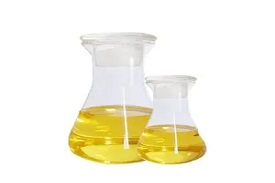
Rubberseed fatty acids are a group of fatty acids derived from the oil extracted from the seeds of the rubber tree (Hevea brasiliensis). The fatty acid composition of rubberseed oil typically includes a high percentage of unsaturated fatty acids, such as oleic acid and linoleic acid, along with smaller amounts of saturated fatty acids, like palmitic acid and stearic acid. Rubberseed fatty acids are utilized in various industrial applications, including the production of biodiesel as a renewable and environmentally friendly alternative to petroleum-based fuels. They are used in the manufacturing of soaps, detergents, and lubricants due to their excellent cleansing and lubricating properties. Rubberseed fatty acids also find applications in the cosmetics and pharmaceutical industries, where they are used as emollients and moisturizers in skincare products and as excipients in drug formulations. Furthermore, rubberseed oil and its fatty acids are being explored for potential applications in the food industry due to their nutritional value and functional properties.
IS 12124:1987 is a critical standard for Rubberseed Fatty Acids, ensuring their quality, safety, and reliability across various industrial applications. This standard provides comprehensive guidelines and specifications for manufacturers, covering essential aspects such as chemical composition, purity levels, and manufacturing processes. By setting clear parameters for factors like acid value, moisture content, and impurity limits, IS 12124:1987 ensures that Rubberseed Fatty Acids meet stringent standards for consistency and suitability in diverse industrial processes, including soap manufacturing, cosmetics production, and rubber processing. Adherence to IS 12124:1987 promotes regulatory compliance and contributes to the overall competitiveness of industries relying on Rubberseed Fatty Acids by ensuring standardized production practices and facilitating market acceptance of Rubberseed Fatty Acid products.
Note: Obtaining the ISI/BIS Certification is a mandatory requirement for manufacturers of rubberseed fatty acids to sell their products in the Indian market.
Manufacturers intending to legally sell rubberseed fatty acids in India must obtain ISI/BIS certification in accordance with mandatory regulations. This certification is vital as it ensures adherence to specific quality and safety standards set by the BIS for the production and distribution of rubberseed fatty acids. Without the ISI/BIS certification, manufacturers risk facing legal repercussions and encountering obstacles in accessing the Indian market. Obtaining this certification is a pivotal step for manufacturers to showcase the reliability, compliance, and quality of their rubberseed fatty acids. This certification process underscores the importance of ensuring the integrity and safety of rubberseed fatty acids, instilling confidence among stakeholders in the chemical industry regarding its suitability and adherence to Indian standards for usage and distribution.
Indian Standards Institute, or ISI was renamed the Bureau of Indian Standards (BIS) in 1987. The official mark that the Bureau of Indian Standards provides for manufacturers of various goods is the ISI Mark. It is used to indicate compliance with Indian standards (IS) set by the Bureau of Indian Standards (BIS) and has been used as a conformity marking for industrial products. Manufacturers received permission from BIS to use the ISI Mark on items that comply with relevant Indian requirements through the product certification program.
Only manufacturers (domestic or foreign) who produce the finished product will be awarded ISI Certification. This will not be given to any product importers, traders, dealers, or distributors.
The following documentation is required to get an ISI certification:
For more detailed information, please click here.
There are two approaches for Indian manufacturers to become certified with the ISI Mark:
Regular Procedure
With the possible exception of cases deemed "All India first," which might take up to 180 days, the licensing procedure is expected to be finished in 120 days. This timeline starts on the day the application is received, assuming that at different points in time the documentation, unit assessment, and product conformance are all deemed acceptable.
Step 1: Manufacturing Unit Customization in Compliance with Applicable Indian Standards
Step 2: Submission of the Application Form
For more detailed information, please click here.
Simplified Procedure
This is a much faster process than the standard procedure. After a factory inspection is deemed satisfactory and the initial evaluation establishes that the sample complies with the applicable Indian Standard(s), the license application process is expected to be finished in 30 days.
Step 1: Adapting the Manufacturing Unit to Comply with the Relevant Indian Standard
Step 2: Sample Testing
For more detailed information, please click here
The process of obtaining ISI Mark Certification for Foreign Manufacturers typically includes the following steps:
Step 1: Application
Step 2: Query Raised (If Any)
For more detailed information, please click here.
Brand Liaison provides helpful support for achieving ISI Mark Certification. Among our offerings are:
Please click here to get in contact with our team of specialists for a deeper explanation of the paperwork and steps needed to get ISI Mark Certification.